
How to score an IELTS Band 8.0
Almost every student we work with is aiming for a 7.0 or higher in the IELTS exam. However, this is not always the case. Sometimes students require an every higher score than this (or what I call a “very very high score”), Take for example our doctors who need who need an overall 7.5, to register with the GMC or those applying to the NHS Foundation Programme who need a 7.5 in each module. In fact, occasionally, we are approached by students who need to score an IELTS Band 8.0. These are usually teachers who need to register in certain states in Australia, or people who need CLB10 or higher to migrate to Canada.
However, how easy is it to score IELTS Band 8.0 and what can you do to help yourself move to this extremely high score? Find out today as Nick and I go through each part of the exam, offering our advice. Trust us – although it definitely isn’t easy, it is possible!
Below, you can find a summary of the episode, which includes all of the links to useful materials and the times of each part of the discussion (so you can go directly to the part you want to listen to) 🚀
Subscribe to My IELTS Classroom podcast on Apple podcasts here
Subscribe to My IELTS Classroom on Google podcasts here
Introduction: The British Council is stopping IELTS in India, and we get a thank you letter from a student who has passed the CPE exam with flying colours
How difficult is it to score IELTS Band 8.0?
Let’s imagine you have a child who starts playing football. You buy them a pair of football shoes and the next day they ask you if they can play for Manchester United. Obviously, you would laugh at this suggestion – after all, your child has been playing for just one day. I think you would have the same reaction even a year or two later. We all know that it takes a lot of time and effort to get to the level when you are ready to play for a professional football team.
I feel the same when a student who is currently has a 6.5 asks me how long it will take them to get to an 8.0. The answer is
A long time!!!
We have spoken repeatedly on the podcast about the fact it takes roughly 200 hours of study to move up 0.5 bands, so the move from a 6.5 to an 8.0 would take at least 600 hours.
Plus, you have to remember that even the most dedicated student may find that they simply do not have the natural aptitude to ever reach advanced / low-proficiency. I say this as a person who has lived in a foreign country for over a decade and is still at B1 level (i.e. I would get a 5.0 if I took the Russian IELTS).
Now, I am not saying that it is impossible to achieve an IELTS Band 8.0, but I want to be very clear that the majority of students who we work with who need this score already have the necessary underlying grammar and lexis. Our job as IELTS experts is to arm them with the academic skills that are also needed to reach such a high score. Don’t get me wrong – that is also not an easy job, but without a foundation of C1 language, it would be absolutely impossible.
So, step one on the path to IELTS Band 8.0 is making sure you have at least an Advanced level of English
If you don’t, then my recommendation would be to pause your IELTS preparation and focus on upgrading your lexis and sentence structures before continuing. I know that this is not what you want to hear, but NOBODY (not even Nick and I), has some “magic tips” that can help you get there without this!
Want to know how the examiner will apply the band descriptors when marking your IELTS essay?
Then download a copy of our FREE e-book, which explains how each of the four marking criteria is applied and includes the most common errors made by test-takers. Just click here for your copy.
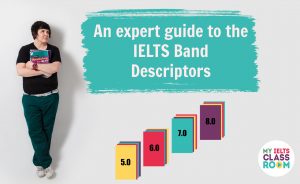
What is needed to score IELTS Band 8.0 in each of the four parts of the exam?
For the rest of the podcast, Nick and I will look at each part of the test, offering our insight into what it takes to move from a band 7.0 to an IELTS Band 8.0.
Reading
Now, in contrast to everything I have said I think that IELTS Reading may be the only part of the exam where it may be possible to make a dramatic leap from a 6.5 to an 8.0. Why? Well, in my experience, many students are trying to answer all of the IELTS reading questions using just scanning and skimming.
This is a recipe for disaster.
I cannot tell you how many students I have worked with who told me that they “can’t answer Headings or Multiple Choice” who are suddenly miraculously able to find all of the answers once they learn the correct basic principles of reading and actually START READING THE PASSAGES!
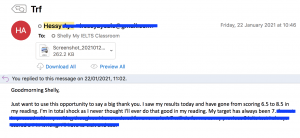
Take Hessy, for example, who was getting a consistent 6.5 in General Training Reading despite being a 7.5 or higher in the other three parts of the exam. She attended our 5 day intensive course in December 2021 and walked away with an 8.5 in the next exam! (NB – In the podcast, I said that she got a 9.0. I misremembered, but it was still a MASSIVE improvement!)
Now, obviously not every student who takes the course will see such a marked improvement, but if you are a student who can score 8.0 in listening and currently relies on scanning and skimming, then I am sure that the move to a “read once, read well” approach will definitely help.
What if you already have good technique?
Now, if you are a student who is already reading the passages, but still is stuck at a 7.0, then my advice would be to start trying to recognise the 3 or 4 questions in each test which are more difficult than the rest.
Not all questions in an IELTS reading or listening test are equal.
As the IELTS test is designed to discriminate between different levels, there are always some questions that can be considered “easy” (for those wanting a 4.0) and a handful that can be considered “very challenging” (for those wanting an 8.0 or higher). What makes a question very challenging? In reading, it is usually either:
- the question targets a very difficult piece of lexis
- the question targets a difficult complex sentence
- the question asked you to infer information from the passage (i.e. to understand what the writer is suggesting)
One of the reasons that many students struggle with Headings Match questions is that they often ask you to summarise in your own words what is happening in a paragraph – this is much more difficult than verifying specific information in a True / False / Not Given question.
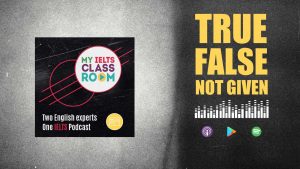
In fact, I know that many students struggle with T/F/NG but if you are genuinely hoping for an 8.0, then you should be able to handle them relatively easily as they are easy to identify in the text. It is the Yes / No / Not Given questions that should have you worried as these rarely contain key words that you can scan for, and locating the sentence that they target can be time-consuming even for a native speaker.
In my experience, it can be the tricky Multiple Choice questions that can be the downfall of high level students, particularly those taking the Academic paper who are unlucky enough to have these questions in Part 3. In the episode, Nick and I discuss what makes this question (from Cambridge Book 15 Test 1) so difficult – can you guess why?
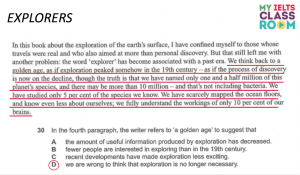
In any case, I think for any student who is aiming for an IELTS Band 8.0, they need to move away from just analysing the “type of question” that they find difficult and move towards identifying what exact skill that question was targeting. You may find that you do not really have a problem with Multiple Choice, but you do have a problem identifying what writers are suggesting (i.e. you cannot infer from a text) or you may find that you are actually good at T/F/NG unless the sentence is targeting a difficult piece of vocabulary (i.e. you have a problem with lexis).
Listening
Listening is very similar to reading in that it tests heavily your lexis and grammar. I would hope that any student aiming for a Band 8.0 would be able to complete Listening Part 1 and Listening Part 2 without making any errors. Maybe if you have a very tricky map, we can forgive you one mistake, but anything more than that is careless and a sign that you are not at the correct level.
I would also hope that you can complete all of Listening Part 4 without any errors either. Now that 100% of the questions are note completion and IELTS has started giving A LOT of notes that help you scaffold, it really isn’t that hard any more to follow the lecture (at least, not as hard as when you had to answer multiple choice questions here!)
For me, all of the glory can be gained and lost in Listening Part 3 as this is where you are asked to listen to the speaker’s attitudes and opinions. What has always shocked me is how few teachers and students realise that this is what is being tested here, so if this is new information for you, I beg that you go and listen to our episode on “recognising agreement and attitude in Listening Part 3”
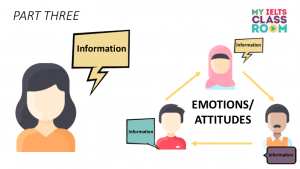
In the episode, ,Nick and I discuss this question and what makes it so tricky:
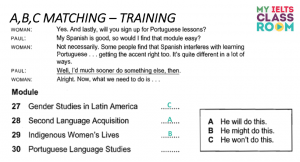
Writing
I guess that this is the big one! So many students ask me what it takes to get IELTS Band 8.0 for writing and my answer is always
the same as what it takes to get a 7.0, but better!
You may think that I am joking, but that really is, more or less, what you need. Your arguments just need to be more detailed, your language more accurate, and your cohesion less obvious.
Don’t worry, we are going to go into more detail for each of the band descriptors but I do think 99% of students would benefit from really taking this advice onward. I get endlessly frustrated when I spend a long time getting a student up to a 7.5 and then, just as we are on the cusp of an 8.0, they start trying to inject their essay with what they think is “Band 8.0 lexis and grammar” and they totally destroy their score and go back down to a 6.5. Listen to me when I say
there are no magic sentence structures or individual words that you can add to your essay to suddenly be at an 8.0
In fact, the harder you try to force lexis and grammar into your paragraphs, the worse your score will be.
We are looking for essays that are naturally written and persuasive.
This means that you must have a great fundamental understanding of the basics of essay writing so that you are able to organise your paragraphs well. If you think that this just means “learning some templates” you really have no idea what writing a good essay takes and will never reach an 8.0.
I am serious! If you think that essay writing is just taking fragments of sentences from one essay and copying them over into the next, you have no chance of getting a very high score. You need to know basic principles such as:
- how to order the information in your essay and in your paragraphs logically
- how to write effective topic sentences
- what to include in your introductions and conclusions
- how to offer your opinion or other people’s
Honestly, this is just the tip of the iceberg, but if you have been trying to reach a very high score using the same essay template for every essay, or by copying language that you have seen in model essays, with no understanding of why that language us being used, then invest in a course that will teach you the fundamental skills that underpin the IELTS band descriptors.
There are many IELTS courses on the market, but I can guarantee that none are as detailed as my 40 hour video course, which is included in all of our Writing Packages!

What about the band descriptors?
Task Response
Well, in terms of Task Response, I will obviously be looking for an essay that addresses the question and has relevant arguments, but for a Band 8.0 I need to see ideas that go beyond the surface of the topic (i.e. not the same old ideas that IELTS students have been recycling for decades (and which are 100% justified).
Look at the ideas that are in the model Band 8.0 essay below – you can see that these are sophisticated and well-argued, and even when the arguments do touch on common topics (i.. the environment) the answers are still 100% tailored to the question given.

Coherence and Cohesion
Band 8.0 Coherence and Cohesion is “invisible”. Now, this does not mean that it is not there, but simply that the reader does not notice it. Take the TV series Friends for example. When you switched it on every week, you expected to see Phoebe, Chandler, and Joey. If they were missing, you would have noticed. But, at the same time, you didn’t need to be told that they were there. In the same way, I expect to see topic sentences, good referencing and clear transitions – but I should notice them as they should be part of the fabric of the essay.
More importantly, a Band 8.0 IELTS essay should use higher level substitution and ellipsis to improve the connection between sentences. In other words, you want to move beyond simple referencing with “they”, “it” or “this” towards more complex referents like “so” or “those” and on some occasions remove whole phrases to remove repetition.
- In conclusion, although children can choose if they want or not to learn a foreign language in secondary school, starting doing it at an early age will only bring more benefits in a child’s development skills. = Band 7.0 referencing
- In conclusion, although children can choose if they want or not to learn a foreign language in secondary school, starting doing so at an early age will only bring more benefits in a child’s development skills. = Band 8.0 referencing
- In fact, not only are the jobs easy to find, but they are also usually more highly-paid in major cities, which, in turn, allows the workers to fulfill their basic needs easily. In contrast, the average salary in rural areas is nowhere near as high as the income of a typical employee in cities = Band 7.0 use of paraphrase
- In fact, not only are the jobs easy to find, but they are also usually more highly-paid in major cities, which, in turn, allows the workers to fulfill their basic needs easily. In contrast, the average salary in rural areas is nowhere near as high = Band 8.0 use of ellipsis
Lexical Resource
In terms of lexis, my main concern would be making sure that there was a lot of topic specific lexis that is used naturally. In my experience, trying too hard to find more and more outlandish synonyms is the most common mistake that keeps people at a 7.0.
Try to make sure your sentences sound natural and include some basic idiomatic language when appropriate. Take a look at this list of appropriately used Band 8.0 lexis that I have taken from a model essay:
- Many countries are now past the point of shortages and economic crisis.
- A sign of social status and a point of pride means they can provide for their families and go beyond simply fulfilling their basic needs.
- In the pursuit of physical goods, people overlook other aspects of life.
- This trend also requires industries to produce even more goods so as to satisfy the ever-growing demand, which, coupled with a lack of proper recycling strategies, is sure to take a toll on the environment.
- It can also lead to a deterioration of human values and put an unnecessary strain on the Earth’s resources.
Now, just to be clear, these expressions were relevant in the context of this essay! Don’t think that you can just memorise these expressions and stick them into any essay – that will not fool the examiner! If this is your current approach, you are not ready to get an IELTS Band 8.0!
Grammatical Range and Accuracy
Just like lexis, the main difference between a 7.0 and an 8.0 is simply reducing the number of errors you make and avoiding any that are systematic (i.e. that you make repeatedly). There are obviously sentence structures that are considered C1 or C2.
These are usually sentences that allow you to change the focus of a sentence (such as invasion, cleft sentences and participle clauses) or sentences that show an advanced knowledge of passives or modals. However, I want to be clear once again that you cannot just “force” examples of these into your essay and expect a high score.
Examiners are looking for language to be used naturally.
I almost regret teaching inversion on my course as students are now obsessed with adding it to every piece of writing even though they are still making errors with the basics like subject / verb agreement and fragments. There are no magic bullets in IELTS!
Speaking
Finally, we have speaking. Nick and I spoke extensively about the Speaking Band Descriptors not that long ago, but we feel that the key for any student trying to move from a Band 7.0 to a Band 8.0 is to speak naturally! Very often I will ask a student a simple question in Part 1 and be given long academic speeches that don’t even really address the question.
Please don’t do this!
Examiners are looking for students who are able to communicate fluently on all sorts of topics – even those as random as trees or hats! Don’t over-think this part – you will have plenty of time in Part 3 to show us your academic language. In Part One, show us that you are able to listen and react to everyday questions with ease as well.
Want to hear how three native speakers would respond to the current Part 1 questions? Then listen to this recent episode of the My IELTS Classroom podcast.
More importantly, if you are serious about getting an 8.0 for Fluency and Coherence, make sure you are able to discuss the more abstract topics given in the final section of Speaking Part 3. This part of the test almost always sorts a Band 7.0 student from a Band 8.0 as only genuinely good speakers are able to handle the difficult questions here.
Just like essays, you want to make sure that you have considered the most common topics before your test day so that you have some ideas for the trickiest themes (i.e. leadership, architecture, etc.) but more importantly you should be prepared to speak even when you don’t have any definitive answers – that is the sign of a truly great commnicator!
